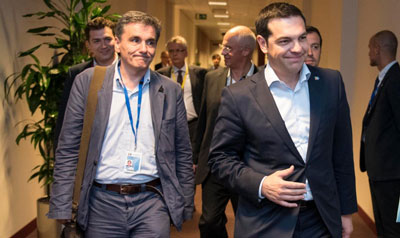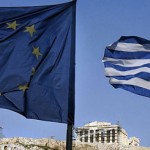Greece to get 6 billion euros in bridge loans if no agreement at Eurogroup

Greece could get 6.04 billion euros in bridge financing if euro zone finance ministers cannot agree on the planned third bailout for Athens when they meet on Friday, according to German newspaper Bild, citing a European Commission proposal for the meeting.
That proposal says the bridge loans should run for a maximum of three months, Bild said in an advance copy of an article due to be published on Friday.
Euro zone finance ministers are due to meet in Brussels on Friday to discuss a third financial rescue that Greece has negotiated with its creditors.
Greek Finance Minister Euclid Tsakalotos expressed his opposition on Thursday to Greece taking another temporary loan to meet its immediate debt repayments, calling on lawmakers to approve a new, three-year bailout deal.
“I think whatever everyone’s stance on the euro and on whether this is a good or bad accord, there must be no one who is working toward a bridge loan,” he told a parliamentary committee.
Athens must make a 3.2 billion euro debt payment to the European Central Bank on Aug. 20.
Greece MPs debate ahead of key bailout vote
Greek members of parliament have debated through the night ahead of a vote on a new bailout agreement.
The proposed deal involves tax rises and spending cuts in return for a third international bailout of about €85bn (£61bn).
Prime Minister Alexis Tsipras has said he is confident he will win the vote, but some senior members of his Syriza party are defying the government.
The debate itself was preceded by hours of often angry exchanges in parliament.
Mr Tsipras needs MPs to vote for a Memorandum of Understanding (MoU) to be adopted before eurozone ministers can endorse the draft deal worth about €85bn (£61bn; $95bn).
The talks continued throughout the night into Friday morning. The eurozone ministers meet later on Friday.
The next crunch deadline for Greece is then 20 August, when it must repay about €3.2bn to the European Central Bank (ECB).
Tempers flared during the overnight debate
Tempers flared during the overnight debate, with the leader of conservative opposition party New Democracy accusing Finance Minister Euclid Tsakalotos of making “provocative” comments.
Vangelis Meimarakis warned Mr Tsakalotos not to take his party’s support for the bailout for granted.
“If you want to provoke us – and for us to vote for it – well, you can’t have it both ways,” he said.
In two prior votes on bailout reforms, Mr Tsipras faced rebellions from his own party, with more than 30 of Syriza’s 149 MPs refusing to approve the latest tax increases, pension cuts and market reforms.
On Thursday, the bill was argued over in committee discussions and procedural wrangling for about nine hours, and the plenary debate did not start until well after midnight.
The leader of Syriza’s far-left faction, former energy minister Panagiotis Lafazanis called for a new movement to fight the deal.
The government said he had clearly decided “to choose a different path from that of the government and Syriza”.
It has defended the controversial new programme as tough but essential if the country is to avoid financial collapse.
The rebels, including parliamentary speaker Zoe Konstantopoulou and former finance minister Yanis Varoufakis, insist the government should make good on its electoral promise to reverse spending cuts and tax rises.
However, lawmakers are expected to approve the MoU by a comfortable margin with the help of opposition parties.
Meanwhile, the International Monetary Fund (IMF) urged Greece’s European partners “to make decisions on debt relief that will allow Greece’s debt to become sustainable”.
Senior IMF official Delia Velculescu said the organisation “will make an assessment of its participation in providing any additional financing to Greece once the steps on the authorities’ programme and debt relief have been taken”.
Her comments followed a meeting earlier this week with Greek and EU financial officials in Athens.
On Thursday, data showed the Greek economy grew by 0.8% in the second quarter of the year, confounding expectations of a steep contraction.
Until the figures were released, the economy had been forecast to shrink again this year by between 2.1% and 2.3%.
Source: BBC
Source: Reuters – Greece to get 6 billion euros in bridge loans if no agreement at Eurogroup: report




























